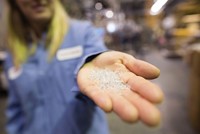Advertisement
Grab your lab coat. Let's get started
Welcome!
Welcome!
Create an account below to get 6 C&EN articles per month, receive newsletters and more - all free.
It seems this is your first time logging in online. Please enter the following information to continue.
As an ACS member you automatically get access to this site. All we need is few more details to create your reading experience.
Not you? Sign in with a different account.
Not you? Sign in with a different account.
ERROR 1
ERROR 1
ERROR 2
ERROR 2
ERROR 2
ERROR 2
ERROR 2
Password and Confirm password must match.
If you have an ACS member number, please enter it here so we can link this account to your membership. (optional)
ERROR 2
ACS values your privacy. By submitting your information, you are gaining access to C&EN and subscribing to our weekly newsletter. We use the information you provide to make your reading experience better, and we will never sell your data to third party members.
Sustainability
Firms back chemical recycling of plastics
Eastman Chemical is dusting off an old process to handle polyester waste
by Alexander H. Tullo
March 8, 2019
| A version of this story appeared in
Volume 97, Issue 10

As pressure builds on chemical makers to solve the plastic waste problem, firms are increasingly exploring chemical recycling as a complement to traditional mechanical techniques.
Eastman Chemical plans to build a facility that will use methanolysis to depolymerize polyethylene terephthalate (PET), used in food packaging and soda bottles, into dimethyl terephthalate and ethylene glycol. The company developed the process decades ago, as Eastman Kodak, to recycle polyester waste such as X-ray film.
Tim Dell, Eastman’s vice president of corporate innovation, is confident the company can build a commercial-scale plant in 24–36 months. “Polyester is one of the chemistries that can be unzipped fairly easily,” he says. “The trick in all of this is to be able to design, engineer, scale, and actually operate a facility.”
Eastman, which makes polyester copolymers, hasn’t decided on a size or location. It is in talks with potential partners to source raw materials. The company is seeking difficult-to-recycle plastics that are unsuitable for mechanical recycling.
In a similar initiative, Loop Industries and the polyester maker Indorama plan to builda plant based on Loop’s PET depolymerization process by 2020. And Aquafil recently opened a facility in Phoenix that recovers nylon from used carpet for later depolymerization.
Seeing such projects as a market, Circular Polymers has opened a plant in Lincoln, California, that will process 14,000 metric tons per year of used carpet into nylon, polyester, and polypropylene. The company aims to provide a reliable feedstock for chemical recycling projects.
“While chemical recyclers can take a higher degree of contamination than mechanical recyclers, they still require a specification,” says Circular CEO David Bender.



Join the conversation
Contact the reporter
Submit a Letter to the Editor for publication
Engage with us on Twitter